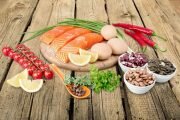Why Organic Food Is Better
I still have one more bone to pick with the Stanford University organic food study I told you about previously. And it concerns the primary reason we eat food in the first place: nutrients.
Stanford researchers found little difference in nutritional values between organic food and conventionally grown foods.
First of all, this doesn’t size up with other studies we’ve seen over the years. There’s a lot of evidence that organic foods do have more nutrients.
Secondly, organic consumers are primarily looking for less exposure to pesticides, herbicides, and genetically modified organisms. So when nutrients are boosted – even a modest amount – that’s an added bonus.
But since the Stanford researchers treat the nutrient issue as if it’s a deal breaker, then I’m fired up to rise to the challenge.
Dial it back
The Stanford team examined 223 field studies that tested nutrient and contaminant levels.
That’s a lot of studies. And it sounds impressive. But that large number is exactly why it’s not impressive.
Think about it… Different farmers use different seeds. Their farms have different soils. Weather conditions vary. Irrigation varies. Maturity of plants at harvest time varies.
Also, for an organic farm, proximity to a non-organic farm often affects crop quality. And environmental issues can throw curveballs. In one season, insects or weeds may be plentiful. In another season, not so much.
So consider all these variables. And consider that the 223 field studies involved a wide variety of fruits, vegetables, and grains.
Finally, consider the researchers. Every research team designs its own methods to analyse data. One team’s methods can vary widely from those of another team. And those variations might produce much different results.
You get the idea. The study is ambitious. But it’s too much. The weight of all these variables is ungainly. It’s comparing apples to oranges to broccoli. So let’s keep it simple.
Here’s a study I told you about several years ago:
US researchers at the University of California-Davis grew kiwifruits with either organic or conventional methods.
All the kiwis grew at the same time on the same farm. Both crops grew in the same type of soil, under the same environmental conditions. And researchers harvested them at the same stage of maturity.
The researchers reported that the organic crop had higher levels of minerals, ascorbic acid, and phenol content. The result: “A higher antioxidant activity.”
There you go. Simple. It’s not the last word in organic food vs. conventional food. But I’ll take this result over a mash up of 223 results.
Here are three actual facts you should know about organic foods.
1) Organic food contains significantly higher phosphorous levels. As I’ve mentioned before, phosphorous helps your body absorb calcium. So it’s a key mineral for bone health. Phosphorous also helps maintain and repair cells.
2) Organic chicken contains higher levels of phenols and other compounds that produce antioxidant effects.
3) Organic milk may contain “significantly higher levels of omega-3 fatty acids.”
These three details all come from one source. The Stanford study.
It’s the same study that produced this misleading headline: “Little evidence of health benefits from organic foods.”
Hmmm… Maybe they don’t know the definition of the word “little.”
Did you find this information useful?
Then why not get more expert health recommendations just like this delivered direct to your inbox?
"It is truly refreshing to read a newsletter on the topic of alternative medicine which is scientifically based and reviewed by professionals..." - Robert Sinott
We respect your privacy and will never share your details with anyone else.Sources:
“Are Organic Foods Safer or Healthier Than Conventional Alternatives?: A Systematic Review” Annals of Internal Medicine, Vol. 157, No. 5, 9/4/12, annals.org
“A Comparative Study of Composition and Postharvest Performance of Organically and Conventionally Grown Kiwifruits” Journal of the Science of Food Agriculture, Published online ahead of print 3/27/07, interscience.wiley.com
“Little evidence of health benefits from organic food, Stanford study finds” Michelle Brandt, Stanford University press release, 9/3/12, med.stanford.edu










